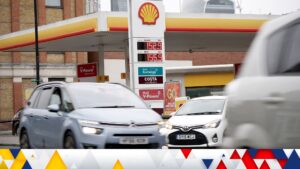
Fuel giants will be told to pass on tax cuts in full to motorists as diesel prices once again hit new highs.
Kwasi Kwarteng, the business secretary, has written to retailers “to remind them of their responsibilities” to pass on savings to motorists after The Times revealed that forecourts were failing to honour nearly half of the tax break.
In the letter he said: “The British people are rightly expressing concern about the pace of the increase in prices at the forecourt, and rightly frustrated that the chancellor’s fuel duty cut does not appear to have been passed through to forecourt prices in any visible or meaningful way.
“It is also unacceptable that different locations even within the same retail chain have widely different prices. The chancellor and I therefore want to re-emphasise and communicate again our expectation that members do everything possible to ensure that drivers are getting a fair deal across the country.”
Kwarteng also said that because of the perceived intransigence to date he has engaged the Competition and Markets Authority to closely monitor the situation at the pumps.
He said: “I have been reassured that they will not hesitate to use their powers to act against petrol stations if there is evidence that they are infringing competition or consumer law.”
It came as motoring groups claimed the surge in online shopping means supermarkets are less reliant on competitive fuel pricing. Edmund King, the president of the AA, said major retailers were using discounted petrol less and less as a means to entice shoppers into aisles, with other tactics, such as branded price matches which also apply online, increasingly favoured.
King said: “In the past you would have always seen the likes of Asda breaking the chain and cutting 3p a litre [off fuel]. Morrison’s would follow and then Sainsbury’s, and so on.
“That kind of cost-cutting was done by the supermarkets to get people down the aisles. With more online shopping, which has continued after lockdown, they don’t have to try quite as hard, such as by discounting fuel, to get people down the aisles of the shops.”
He added that towns with major supermarkets, predominantly Asda, would typically “bring down the prices across the board” because they were always more competitive, adding: “Pricing at the moment seems less competitive than it has been traditionally.”
Figures from Experian Catalist revealed that average prices on Monday were 180.3p per litre for diesel and 166.8p per litre for petrol.
On March 23, when the duty cut was announced, they were 179.9p and 167.01p respectively.
The RAC has warned that retailers are taking 2p a litre more profit than before the policy came in, making 11p a litre on unleaded and 8p on diesel.
King said it was “increasingly clear” that fuel prices were creeping back up despite the fact that a barrel of Brent Crude, the global benchmark, had changed little. It stood at $113 a barrel when the policy was announced and has since fluctuated between $110 and $114. Gordon Balmer, executive director of the Petrol Retailers Association, which represents independent forecourts, said comparing pump prices with wholesale prices “only gives a partial picture” once storage and delivery costs are taken into account alongside the “volatility of product prices”.
Read more:
Ministers insist retailers must pass on petrol tax cut in full

